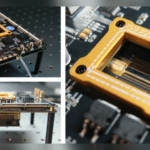Hold onto your hoverboards, tech fans! Google’s parent company Alphabet just made waves with its new quantum computing chip, Willow—and investors are hyped. Shares surged 5% after the breakthrough announcement this week. But what does it mean for the future of tech? Let’s break it down.
🖥️ The Quantum Promise
Quantum computers use 'qubits' instead of traditional bits, letting them solve mind-bending problems faster than today’s supercomputers. The catch? More qubits usually mean more errors. Enter Willow: Google claims it slashes error rates as qubits increase and fixes mistakes in real-time. Imagine solving a task in minutes that would take regular computers billions of years. 🤯
⌛ Why It Matters
This isn’t just sci-fi stuff. Quantum tech could revolutionize fields like drug discovery, climate modeling, and AI. But experts like Surrey University’s Prof. Alan Woodward warn: 'Don’t compare apples and oranges.' While Willow aced a specific test, practical, everyday quantum computers are still years away.
🔮 The Long Game
Since physicist Richard Feynman dreamed up quantum computing in 1981, progress has been slow but steady. Alphabet’s leap adds fuel to the race with IBM, Microsoft, and others. Will quantum replace your laptop? Nope—think of it as a superhero sidekick for ultra-complex tasks. 🦸♂️
One thing’s clear: The quantum future just got a little brighter. Stay tuned.
Reference(s):
cgtn.com







